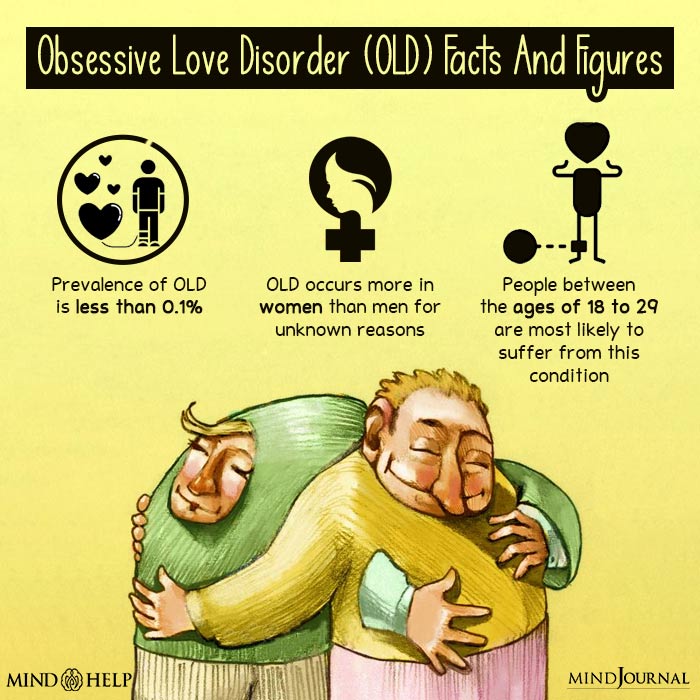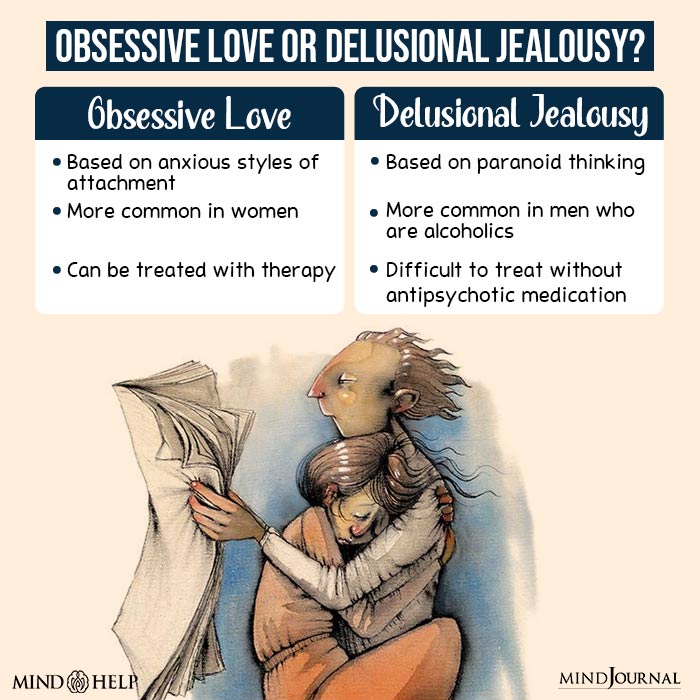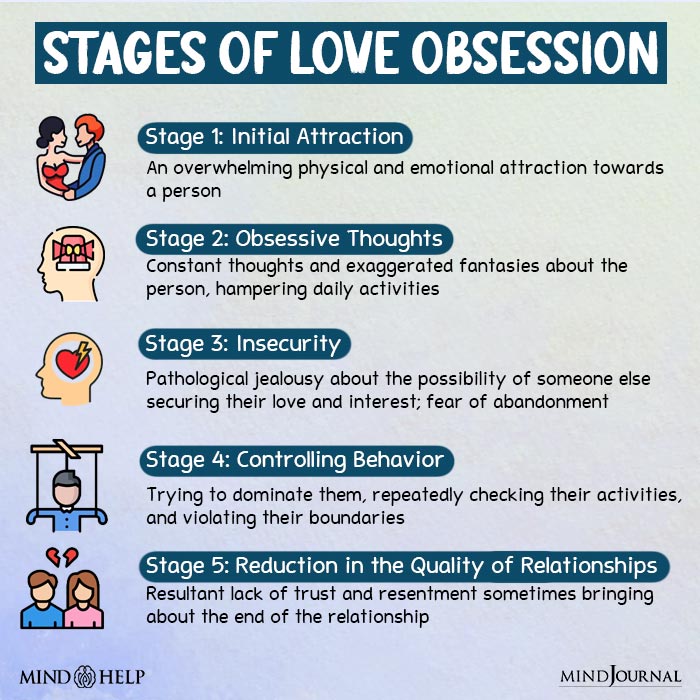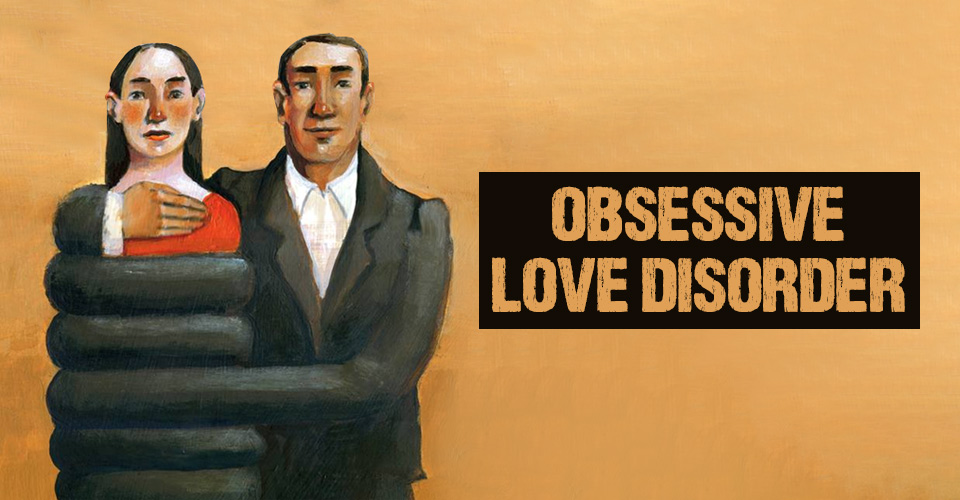Table of Contents
Obsessive love disorder (OLD) is a mental health condition in which an individual overwhelmingly feels an obsessive desire to protect, possess, and control their love interest.
What Is Obsessive Love Disorder?
Obsessive love disorder (OLD) is a condition that occurs as a result of an insecure attachment style. The fact that distinguishes healthy and obsessive love is that in the latter, a person experiences an obsessive urge to possess and control their subject of affection.
It is a mental health condition belonging to the obsessive-compulsive spectrum 1 Abbey, R. D., Clopton, J. R., & Humphreys, J. D. (2007). Obsessive-compulsive disorder and romantic functioning. Journal of clinical psychology, 63(12), 1181–1192. https://doi.org/10.1002/jclp.20423 of disorders and it negatively correlates with romantic/ sexual intimacy, relationship satisfaction, and self-disclosure.
The theory of obsessive love and its clinical equivalent is thought to originate from Austrian psychiatrist Sigmund Freud’s theory of seduction and obsessional neurosis 2 Freud A. (1966). Obsessional neurosis: a summary of psycho-analytic views as presented at the Congress. The International journal of psycho-analysis, 47(2), 116–122. in the early 20th century. It was built on by the school of Jungian or Analytical psychology and by French literary theorist Marcel Proust 3 Gammelgaard J. (2011). Love, drive and desire in the works of Freud, Lacan and Proust. The International journal of psycho-analysis, 92(4), 963–983. https://doi.org/10.1111/j.1745-8315.2011.00355.x in his 1910s work In Search of Lost Time.
Obsessive love disorder is an unrecognized mental health disorder in psychiatric manuals like the American Psychological Association’s Diagnostic and Statistical Manual of Mental Disorders (DSM) or the WHO’s International Classification of Diseases (ICD).
Many experts even argue that it is not a disorder in itself but can give origin to multiple mental disorders. Nonetheless, popular clinical practice shows frequent instances of diagnosis of OLD.

Symptoms of Obsessive Love Disorder
Given below are some qualities 4 Bogerts B. (2005). Liebe und Eifersucht bis zum Wahn gesteigert. Wenn der Lebensgefährte plötzlich den Othello gibt [Delusional jealousy and obsessive love–causes and forms]. MMW Fortschritte der Medizin, 147(6), 26–29. of obsessive love that you might want to look out for:
- An overwhelming sense of attraction toward your partner or love interest
- Low self-esteem
- Fear of abandonment
- Intrusive thoughts and obsessive fantasies about the person you’re attracted to
- Feeling uncomfortable with boundaries and unable to give them space
- Trying to control or dominate the person you are in love with
- Pathological jealousy
- Inability to react healthily to criticism or rejection
- Repeatedly and obsessively checking on your loved one (via texts, emails, and phone calls)
- Poor quality of social relationships
A lot of the signs of obsessive love disorder can be found overlapping with disorders such as borderline personality disorder and dependent personality disorder. It is in fact, an amalgamation of several such personality traits.

Read About Personality Disorders Here
Causes Of Obsessive Love Disorder
Research suggests the following reasons why a person may develop obsessive love disorder:
1. Childhood trauma and neglect
Several links remain established between obsessive love disorder and childhood trauma. Traumatic experiences in childhood 5 Godbout, N., & Runtz, M., & MacIntosh, H., & Briere, J. (2013). Childhood trauma and couple relationships. Available from: https://www.researchgate.net/publication/263047278_Childhood_trauma_and_couple_relationships have been associated with numerous problems in adult relationships. Survivors of childhood abuse can sometimes develop severe issues of abandonment which is characteristic of obsessive love disorder.
Studies have also established a strong relationship between obsessive love and anxious and avoidant attachment styles 6 Ahmadi, V. , Davoudi, I. , Ghazaei, M. , Mardani, M. , & seifi, S. (2013). Prevalence of Obsessive Love and Its Association with Attachment Styles. Procedia – Social and Behavioral Sciences, 84 . doi: 10.1016/j.sbspro.2013.06.629 that people may develop during their childhood. These mainly occur when caregivers are unable to satisfy the needs of their children.
2. Socio-cultural norms
Certain social and cultural norms may also be the reason for obsessive love habits to develop over time. Specifically, in heterosexual relationships that adhere to patriarchal norms and notions of toxic masculinity, the male partner is often expected to exert control over the female.
Exposure to such an unequal or abusive partner dynamic while growing up can make a person mistake obsessive love for healthy love.
3. Personality traits
Obsessive love disorder can stem from certain temperament and character traits 7 Sophia, E. C., Tavares, H., Berti, M. P., Pereira, A. P., Lorena, A., Mello, C., Gorenstein, C., & Zilberman, M. L. (2009). Pathological love: impulsivity, personality, and romantic relationship. CNS spectrums, 14(5), 268–274. https://doi.org/10.1017/s1092852900025438 such as:
- Impulsivity
- Concern over punishment
- Reward dependence
- Low self-determination
- Low co-operativeness
The personality trait of neuroticism 8 Davies, M. F. (1996). EPQ correlates of love styles. Personality and Individual Differences, 20(2), 257–259. https://doi.org/10.1016/0191-8869(95)00188-3 has also been seen to be positively associated with obsessive, possessive, and ‘manic’ love.
Obsessive Love Disorder Diagnosis
Obsessive love disorder is not officially recognized by psychiatric manuals; however, its prevalence has been well documented in research.
Since the symptoms of obsessive love disorder coincide with several other mental health conditions, it is not diagnosed by professionals as an independent disorder.
Nevertheless, in a clinical setting, a mental health professional (MHP) would first take a detailed history of your symptoms along with your family history while ruling out the possibility of other health conditions before proceeding to chalk out the most suitable treatment plan for your condition.

There are no assessments specifically designed for obsessive love disorder but certain scales such as the Relationship Obsessive Compulsive Disorder Inventory 9 Ghomian, S., & Shaeiri, M., & Farahani, H. (2019). Psychometric Features of Relationship Obsessive-Compulsive Inventory: A scale in the Field of Relationship Obsessive-Compulsive Disorder. 154-161. Available from: https://www.researchgate.net/publication/335961516_Psychometric_Features_of_Relationship_Obsessive-Compulsive_Inventory_A_scale_in_the_Field_of_Relationship_Obsessive-Compulsive_Disorder may be used by clinicians to better understand the symptoms.
Treatment For Obsessive Love Disorder
There are several ways to address obsessive love symptoms. Treatment usually depends on how the symptoms present themselves and possible underlying factors.
Consider the following measures to overcome love obsession:
1. Psychotherapy
A number of therapies can be useful in managing obsessive love disorder. These include:
• Cognitive-behavioral therapy (CBT)
Experts suggest that pathological love styles are maintained due to faulty thinking patterns, such as the belief that your partner will leave you if you are not possessive. Cognitive-behavioral therapy can help change such patterns in people suffering from obsessive love disorder and reorient them to engage in healthier behaviors and coping mechanisms.
Read More About Cognitive Behavioral Therapy Here
• Dialectical behavioral therapy (DBT)
Dialectical-behavioral therapy was originally introduced as a treatment for borderline personality disorder but is now widely used for other related conditions involving partner-directed violent and controlling behavior. In a person with obsessive love disorder, DBT can help regulate emotions in a better manner.
• Psychoanalytic therapy
Obsession with a love interest, according to psychodynamic theories, can arise due to the absence or inadequate presence of an “object” of attachment 10 Mitchell, L. Attachment to the Missing Object: Infidelity and Obsessive Love. Journal of Applied Psychoanalytic Studies 2, 383–395 (2000). https://doi.org/10.1023/A:1010179023697 in the early years of one’s development. Short-term psychodynamic therapies have proven to be quite successful in discovering probable childhood roots to such maladaptive behavior.
2. Medication
Generally, medication is not the first treatment of choice for obsessive love disorder. However, if the condition is due to severe underlying personality disorders, pharmacotherapy may prove more useful.
Popular practice frequently includes the following medication in obsessive love disorder treatment plans:
- Anti-anxiety medications
- Antidepressants [Read more]
- Antipsychotics
- Mood stabilizers
Coping With Obsessive Love Disorder
Although there is no go-to recipe on how to get rid of obsessive love, you may consider the following measures to cope with obsessive love disorder:
- In order to break free from obsessive love, the first step is to acknowledge that you may have a mental health condition that is driving your behavior.
- Begin by identifying maladaptive patterns in yourself and taking note of your triggers.
- Give yourself some space to better process your emotions and write them down if you want.
- Practice mindfulness to eventually be able to detach from your thoughts.
- Try to make a daily schedule inclusive of hobbies and activities that you enjoy without your partner/ love interest and that involve your wholehearted attention.
- Read about and expose yourself to examples of healthy love and relationships.
- Last but not the least, do not hesitate to seek professional help if your symptoms seem unmanageable.
Takeaway
Obsessive love disorder (OLD) is a serious mental health condition that can negatively impact your normal functioning, social relationships, and overall quality of life. If left unaddressed, it can severely strain relationships with your partner or loved ones 11 Doron, G., Derby, D., Szepsenwol, O., Nahaloni, E., & Moulding, R. (2016). Relationship Obsessive-Compulsive Disorder: Interference, Symptoms, and Maladaptive Beliefs. Frontiers in psychiatry, 7, 58. https://doi.org/10.3389/fpsyt.2016.00058 .
Undiagnosed OLD can also culminate in more severe socially crippling mental health conditions. Therefore, its timely diagnosis and proper treatment are essential for addressing its long-term consequences and enjoying a happier, more fulfilling life.
At A Glance
- Obsessive love disorder (OLD) is a type of insecure attachment style in which a person develops an obsession to protect and control the person they ‘love’.
- OLD is not officially recognized by psychiatric manuals.
- The typical symptoms of obsessive love disorder include a pathological obsession with one’s subject of affection, constant thoughts about them, fantasies about possessiveness, low self-esteem, volatile reaction to rejection, etc.
- Untreated obsessive love disorder symptoms can negatively affect intimate and familial relationships.
- People with a history of childhood trauma and certain personality types (like neuroticism) are prone to this disorder.
- Availing therapy and developing healthy self-help strategies can help you successfully deal with obsessive love disorder.















